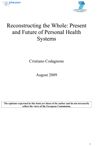
The book envisages the research themes needed to be funded and pursued in the future in order to infuse PHS with bio-medical knowledge, produce more intelligent data processing in support of decision making and actuation, develop minimally invasive third generation sensors with multi-signs gathering and on board processing capabilities, design more inclusive and user friendly interfaces, advance achievements in Lab on Chip.
Broader socio-economic issues and barriers are also addressed in the discussion of future scenarios (chapter 3) and of implementation gaps (chapter 5). The book integrates into a coherent and to some extent more synthetic fashion the contents of four substantive project deliverables (downloadable below). These deliverables cover in great details all the methodological steps, from the State of Play, to the construction of future Scenarios, to the Gap Analysis and the final Road Maps. They illustrate in great depth all the methodological technicalities, the sources gathered and analysed, and very extensively the findings of the project. They represent the wider background and knowledge base on which the final book rests.
The findings of PHS2020 incorpotate the input from the project standing Expert Support Committee (that met five times over the duration of the project and constantly evaluated, commented and validated the deliverable produced) and from a large number of experts and stakeholders from across Europe and from all relevant expertise and areas (healthcare institutions and professionals, ICT industry and technology experts, policy making bodies, experts of broadly defined socio-economic relevant topics; researchers) who participated to 10 consultation events. So the book benefits from the input from such a large pool of very distinguished experts and stakeholders.
Download Reconstructing the Whole: Present and Future of Personal Health Systems (.pdf, 3.893 KB).
Download from eHealthNews.eu Portal's mirror: Reconstructing the Whole: Present and Future of Personal Health Systems (.pdf, 3.893 KB).
Related article:
- FP7 Projects: PHS2020